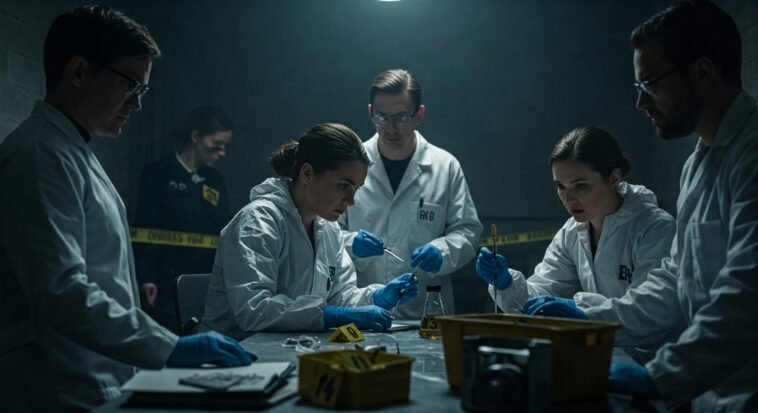
Ever wonder why someone commits a crime, or how we know if they’re fit for trial?
Forensic psychology is where psychology meets the law, helping solve everything from criminal investigations to courtroom drama.
These psychologists are the unsung heroes who evaluate mental health, give expert testimony, and make sure justice is served.
In this article, we break down what forensic psychology is, how you can build a career in it, and why it’s so crucial in the criminal justice world.
Whether you’re a student or just love a good crime mystery, this guide’s your ticket into the fascinating world of forensic psychology!
What Is Forensic Psychology? A Clear Definition
Forensic psychology is all about using psychology to help solve legal and criminal justice puzzles.
It’s like when your favorite detective on a crime show brings in an expert to explain the psychological side of things—whether it’s analyzing criminal behavior, figuring out if someone’s mentally fit for trial, or even helping in courtrooms.
According to the American Psychological Association (APA), forensic psychology is basically when clinical psychology meets the legal world.
Key areas forensic psychologists focus on:
- Criminal behavior analysis (What makes someone tick?)
- Mental competency evaluations (Is this person fit to stand trial?)
- Expert witness testimony (Explaining the mind in court)
- Risk assessments (How likely is someone to commit another crime?)
- Juvenile justice evaluations (Helping young offenders)
- Counseling for victims and offenders (Helping people heal and change)
In a nutshell: Forensic psychologists are the bridge between psychology and law, helping judges, lawyers, and cops understand the human mind when it comes to legal stuff.

The Role of a Forensic Psychologist
Forensic psychologists don’t spend their days chasing down criminals or having dramatic standoffs in alleyways (sorry, no action movie scenes here).
Instead, their work is more like being a detective of the mind—analyzing, assessing, and advising on how psychology fits into the legal world.
What forensic psychologists do:
Conduct psychological assessments:
- Can someone stand trial?
- Is someone criminally responsible (like, are they legally insane)?
- Should their sentence be harsher or lighter?
Expert testimony in court:
- Explaining mental health diagnoses to the jury
- Evaluating if a person is likely to commit another crime
- Helping the court understand eyewitness memory issues
Help law enforcement:
- Criminal profiling (thinking like the criminal)
- Interrogation tips and tricks
- Stress relief for the officers doing the tough work
Rehabilitation & counseling:
- Working with inmates and troubled teens
- Designing treatment plans for behavioral change
- Helping victims cope with trauma
Important: Forensic psychologists are all about staying neutral. They’re not taking sides—they’re just telling it like it is, based on the facts.
Education and Training: How to Become a Forensic Psychologist
Want to become a forensic psychologist?
It’s not just about watching crime shows—it’s about diving deep into the human mind and the law.
Here’s how you can start your journey to becoming a real-life expert who helps solve cases, evaluate criminals, and make sure justice is served.
Step-by-step career path:
Earn a bachelor’s degree
- Major in psychology, criminal justice, or sociology. Think of this as your first “level up” in the game of forensic psychology.
- Take classes on research, statistics, and abnormal psychology. Basically, learn the building blocks of how people think, act, and break the law.
Pursue a Master’s or Doctoral Degree (Ph.D. or Psy.D.)
- Specialize in forensic psychology (or clinical psychology with a focus on forensic work).
- Find an accredited program that has internships or practica in real-life forensic settings. Think of this like your internship at the “crime lab” where you get to practice what you learned.
Get licensed
- You need to be officially licensed to practice as a psychologist.
- This means putting in hours of supervised work and passing the Examination for Professional Practice in Psychology (EPPP). Yup, it’s like the final boss fight of your education journey!
Optional: Pursue board certification
- The American Board of Forensic Psychology offers board certification. This isn’t required, but it shows you’re a top-tier expert in forensic psychology. Think of it as a shiny badge you can show off.
Soft skills that help:
- Strong ethical judgment: You’ll need to make tough calls and always be on the side of what’s right. No room for gray areas in this career.
- Emotional resilience: You’ll be dealing with heavy stuff—being able to bounce back emotionally is key.
- Analytical thinking: Crime scenes are puzzles, and you’ll need to be great at piecing things together.
- Communication and writing skills: You’ll need to explain complicated stuff clearly to judges, lawyers, and the public.
- Ability to stay neutral under pressure: No matter what happens in the courtroom, you’ll need to keep your cool and focus on the facts.

Real-World Applications of Forensic Psychology
Forensic psychology is like the behind-the-scenes hero in a crime drama, always there but not always in the spotlight.
It’s involved in everything from solving crimes to helping people recover after trauma.
Here’s how forensic psychologists make a difference in real life.
1. Criminal investigations
Forensic psychologists team up with detectives to create psychological profiles of criminals—especially for tricky cases like serial crimes.
Think of it like “mind hunting”—figuring out the kind of person who could commit a crime based on their behaviors and personality traits.
It’s less dramatic than what you see in movies, but it can help narrow down suspects and predict future actions.
2. Court evaluations
In the courtroom, forensic psychologists are like human lie detectors and mental health experts all rolled into one.
They evaluate things like:
- Competency to stand trial (Is the defendant able to understand what’s happening in court?)
- Insanity defense (Were they out of their mind when they committed the crime?)
- Risk to society (Are they likely to reoffend?)
These evaluations help the court decide on things like sentencing and parole.
So, their work can seriously affect someone’s future.
3. Corrections and rehabilitation
Inside prisons, forensic psychologists are on the front lines of rehab. They help:
- Create behavior modification programs to help inmates improve.
- Counsel inmates who are struggling with mental health issues.
- Assess readiness for parole, determining if an inmate is ready to re-enter society or still a danger.
Their goal? To help reduce reoffending, making sure people don’t end up back behind bars.
4. Victim advocacy
Forensic psychologists don’t just work with criminals.
They also help victims of crime, especially those dealing with serious trauma like PTSD, domestic violence, or childhood abuse.
They guide victims through the legal system and support their emotional recovery, helping them regain a sense of control over their lives.
5. Jury selection and trial consulting
Ever wondered how lawyers pick the “perfect” jury?
Some forensic psychologists work as trial consultants—helping with:
- Jury selection (Who’s likely to be swayed by the case?)
- Witness preparation (Making sure witnesses don’t crack under pressure)
- Assessing jury bias and group dynamics (What’s the jury thinking when they’re deliberating?)
This role mixes psychology, law, and a little bit of showbiz, making sure everything runs smoothly in the courtroom.
Forensic Psychology vs. Criminal Psychology: What’s the Difference?
While often used interchangeably, these two fields differ in scope:
| Aspect | Forensic Psychology |
Criminal Psychology
|
| Focus | Legal system and courts |
Criminal behavior and motives
|
| Key Activities | Court evaluations, expert testimony |
Profiling, offender analysis
|
| Work Settings | Courts, prisons, legal consultancies |
Police departments, crime units
|
Forensic psychology is broader, while criminal psychology is more investigative in nature.
Challenges in Forensic Psychology
Forensic psychology sounds cool, right? But let’s be real—there are some pretty tough parts of the job.
Here’s a breakdown of the challenges:
1. Emotional toll
Imagine listening to someone’s darkest, most traumatic experiences day in and day out.
That’s part of the deal when you’re working with trauma survivors or dangerous offenders.
It’s tough to keep your own emotions in check when you’re dealing with such heavy stuff.
2. Ethical dilemmas
Forensic psychologists walk a fine line between clinical care (helping people with their mental health) and the legal demands (being objective and sometimes even harsh in court).
It’s like being a superhero who has to decide when to save the day and when to follow the law to the letter.
3. Security concerns
Prisons aren’t exactly “vacation spots,” and working in those environments can be risky.
Forensic psychologists may deal with dangerous offenders who aren’t exactly thrilled to be examined or counseled.
4. Pressure of objectivity
In court, forensic psychologists are often questioned by lawyers from both sides—each trying to get them to say what works in their favor.
Staying neutral and sticking to the facts can be tough when the courtroom turns into a battlefield.

The Future of Forensic Psychology: Growing Demand and New Tools
Here’s the exciting part: forensic psychology is growing, and the future looks high-tech and in-demand!
1. More jobs, more opportunities
As we get more aware of mental health’s role in justice, the need for forensic psychologists is increasing.
The Bureau of Labor Statistics (BLS) predicts job growth in this field, especially for those who specialize in legal psychology.
2. Tech innovations
Tech is changing the game for forensic psychologists. Some of the cool stuff happening includes:
- AI-assisted risk assessments (like a robot helping to predict if someone might reoffend).
- Virtual reality for court simulations (imagine practicing courtrooms in VR—talk about the future).
- Online therapy platforms in correctional facilities, making therapy more accessible for inmates.
Conclusion: A Career That Makes an Impact
Forensic psychology is all about mixing the mind with the law.
Think of it like the cool, behind-the-scenes work that helps solve crimes and make the justice system smarter.
Forensic psychologists do things like profiling criminals, evaluating if someone’s mentally fit for trial, and helping both offenders and victims.
It’s not all glitz and glam like the TV shows, but forensic psychologists play a huge role in making sure the legal system is fair and humane.
They work in courtrooms, prisons, and even help pick juries (like a psychological version of “The Voice”).
If you’re into human behavior, justice, or just want to make a difference, this career is as rewarding as it is interesting.
Plus, mental health is a big deal in today’s world, so forensic psychologists are in higher demand than ever.



